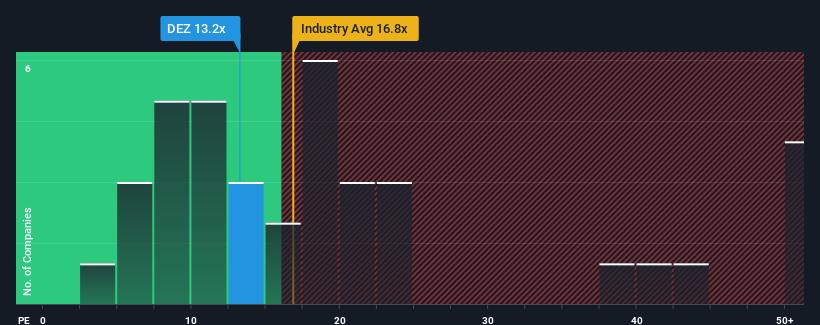Cautious Investors Not Rewarding DEUTZ Aktiengesellschaft's (ETR:DEZ) Performance Completely

When close to half the companies in Germany have price-to-earnings ratios (or "P/E's") above 17x, you may consider DEUTZ Aktiengesellschaft (ETR:DEZ) as an attractive investment with its 13.2x P/E ratio. However, the P/E might be low for a reason and it requires further investigation to determine if it's justified.
DEUTZ hasn't been tracking well recently as its declining earnings compare poorly to other companies, which have seen some growth on average. The P/E is probably low because investors think this poor earnings performance isn't going to get any better. If this is the case, then existing shareholders will probably struggle to get excited about the future direction of the share price.
Check out our latest analysis for DEUTZ

How Is DEUTZ's Growth Trending?
The only time you'd be truly comfortable seeing a P/E as low as DEUTZ's is when the company's growth is on track to lag the market.
If we review the last year of earnings, dishearteningly the company's profits fell to the tune of 64%. Still, the latest three year period has seen an excellent 106% overall rise in EPS, in spite of its unsatisfying short-term performance. Accordingly, while they would have preferred to keep the run going, shareholders would probably welcome the medium-term rates of earnings growth.
Looking ahead now, EPS is anticipated to climb by 26% during the coming year according to the five analysts following the company. That's shaping up to be materially higher than the 20% growth forecast for the broader market.
In light of this, it's peculiar that DEUTZ's P/E sits below the majority of other companies. It looks like most investors are not convinced at all that the company can achieve future growth expectations.
What We Can Learn From DEUTZ's P/E?
While the price-to-earnings ratio shouldn't be the defining factor in whether you buy a stock or not, it's quite a capable barometer of earnings expectations.
We've established that DEUTZ currently trades on a much lower than expected P/E since its forecast growth is higher than the wider market. When we see a strong earnings outlook with faster-than-market growth, we assume potential risks are what might be placing significant pressure on the P/E ratio. It appears many are indeed anticipating earnings instability, because these conditions should normally provide a boost to the share price.
You always need to take note of risks, for example - DEUTZ has 2 warning signs we think you should be aware of.
If these risks are making you reconsider your opinion on DEUTZ, explore our interactive list of high quality stocks to get an idea of what else is out there.
New: Manage All Your Stock Portfolios in One Place
We've created the ultimate portfolio companion for stock investors, and it's free.
• Connect an unlimited number of Portfolios and see your total in one currency
• Be alerted to new Warning Signs or Risks via email or mobile
• Track the Fair Value of your stocks
Have feedback on this article? Concerned about the content? Get in touch with us directly. Alternatively, email editorial-team (at) simplywallst.com.
This article by Simply Wall St is general in nature. We provide commentary based on historical data and analyst forecasts only using an unbiased methodology and our articles are not intended to be financial advice. It does not constitute a recommendation to buy or sell any stock, and does not take account of your objectives, or your financial situation. We aim to bring you long-term focused analysis driven by fundamental data. Note that our analysis may not factor in the latest price-sensitive company announcements or qualitative material. Simply Wall St has no position in any stocks mentioned.
About XTRA:DEZ
DEUTZ
Develops, manufactures, and sells diesel and gas engines in Europe, the Middle East, Africa, the Asia Pacific, and the Americas.
Reasonable growth potential with adequate balance sheet and pays a dividend.
Similar Companies
Market Insights
Community Narratives



